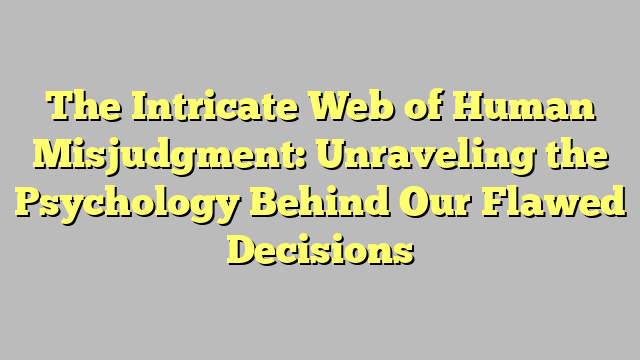The Intricate Web of Human Misjudgment: Unraveling the Psychology Behind Our Flawed Decisions
The Intricate Web of Human Misjudgment: Unraveling the Psychology Behind Our Flawed Decisions
Human beings are complex creatures, capable of incredible feats of intelligence and creativity. However, we are also prone to making flawed decisions, often without even realizing it. The field of psychology has long been fascinated by the ways in which our minds can lead us astray, and the study of human misjudgment has revealed a web of intricate and often surprising factors that can influence our decision-making processes.
The Influence of Cognitive Biases
One of the key factors that can lead to flawed decision-making is the presence of cognitive biases. These biases are mental shortcuts that our brains use to make sense of the world, but they can also lead us to make errors in judgment. For example, confirmation bias is the tendency to seek out information that confirms our existing beliefs, while ignoring evidence that contradicts them. This can lead us to make decisions based on incomplete or biased information, rather than taking a more objective approach.
Another common cognitive bias is the availability heuristic, which is the tendency to overestimate the likelihood of events that are easily recalled from memory. This can lead us to make decisions based on vivid or recent examples, rather than considering the full range of possibilities. These and many other cognitive biases can have a powerful influence on our decision-making processes, often without us even realizing it.
The Role of Emotions
Emotions also play a significant role in our decision-making processes, and they can often lead us astray. For example, the fear of loss can lead us to make overly cautious decisions, even when the potential benefits outweigh the risks. On the other hand, the lure of potential rewards can lead us to take unnecessary risks, without fully considering the potential downsides.
Emotions can also cloud our judgment in more subtle ways. For example, the halo effect is the tendency to let our overall impression of a person or situation influence our judgments about specific traits or behaviors. This can lead us to make biased decisions based on our emotional reactions, rather than taking a more rational approach.
The Impact of Social Influences
Our decisions are also influenced by the people around us, and social factors can play a significant role in leading us to make flawed judgments. For example, the phenomenon of groupthink occurs when the desire for harmony or conformity within a group leads to irrational or dysfunctional decision-making. This can lead to a lack of critical thinking and a failure to consider alternative viewpoints, ultimately leading to flawed decisions.
Social influences can also lead us to make decisions based on social norms or expectations, rather than our own individual values and priorities. This can lead to a disconnect between our true desires and the decisions we ultimately make, leading to a sense of dissatisfaction or regret.
Unraveling the Web of Misjudgment
Understanding the complex web of factors that can lead to flawed decision-making is an important step in learning how to make better choices. By recognizing the influence of cognitive biases, emotions, and social factors, we can begin to take a more critical and reflective approach to our decision-making processes.
One effective strategy for unraveling the web of misjudgment is to seek out diverse perspectives and alternative viewpoints. By considering a range of opinions and possibilities, we can avoid the pitfalls of groupthink and confirmation bias, and make more informed and rational decisions.
Another important step is to cultivate self-awareness and emotional intelligence. By recognizing our own emotional reactions and biases, we can learn to take a more balanced and rational approach to decision-making, rather than being swayed by our immediate impulses and reactions.
Conclusion
The psychology behind our flawed decisions is a complex and multifaceted topic, but by unraveling the intricate web of factors that can lead us astray, we can learn to make better choices. By recognizing the influence of cognitive biases, emotions, and social factors, and taking a more critical and reflective approach to our decision-making processes, we can begin to navigate the complexities of human misjudgment with greater clarity and insight.

